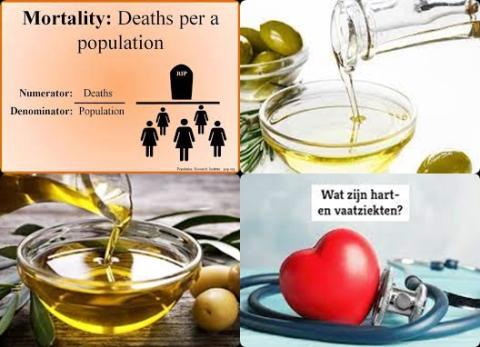
Objectives:
Epidemiological studies have shown the preventive effects of olive oil consumption against cardiovascular events and all-cause deaths, but the results remain inconsistent. Therefore, this meta-analysis (review article) has been conducted.
Does higher olive oil consumption reduce the risk of cardiovascular disease and all-cause mortality?
Study design:
This review article included 13 prospective cohort studies.
These studies were published between 2003 and 2022, with follow-up intervals ranging from 4 to 28 years.
Most of studies collected the dietary data on olive oil intake based on food-frequency questionnaires and the outcome events were identified using International Classification of Diseases codes or other medical records.
All of the studies were assigned a NOS score of ≥7, indicating the evidence of high methodological quality.
There was no publication bias.
Results and conclusions:
The investigators found meta-analysis of 8 cohort studies (261,016 participants and 14,033 cardiovascular disease cases) showed versus lowest consumption of olive oil, high consumption of olive oil significantly reduced risk of cardiovascular disease with 15% [pooled RR = 0.85, 95% CI = 0.77 to 0.93, p 0.001, I2 = 41%, p = 0.107].
Subgroup analyses showed no significant differences between strata of study region, sample size, follow-up duration, sex and olive oil type.
The combined risk estimate of cardiovascular disease was not altered in the sensitivity analysis by omitting each study one at a time.
The investigators found meta-analysis of 11 cohort studies (713,000 participants and 173,817 deaths) showed versus lowest consumption of olive oil, high consumption of olive oil significantly reduced risk of all-cause mortality with 17% [pooled RR = 0.83, 95% CI = 0.77 to 0.90, p 0.001, I2 = 93%, p 0.001].
Excluding each report in sequence had no influence on the pooled result.
The combined RRs were similar between subsets stratified by the aforementioned features.
The investigators found in dose-response meta-analysis, a significantly reduced risk of 4% for cardiovascular disease per 5-g/day increase in olive oil intake [RR = 0.96, 95% CI = 0.93 to 0.99, p = 0.005].
The investigators found in dose-response meta-analysis, a significantly reduced risk of 4% for all-cause mortality per 5-g/day increase in olive oil intake [RR = 0.96, 95% CI = 0.95 to 0.96, p 0.001].
The investigators found non-linear associations of olive oil intake with cardiovascular disease and all-cause mortality [both p for non-linearity 0.001], with little additional or no risk reduction observed beyond the consumption of approximately 20 g/day.
The investigators concluded that olive oil consumption reduces the risk of cardiovascular disease and all-cause mortality. Such benefits seem to be obtained with an intake of olive oil up to 20 g/day. These results support the current dietary recommendations to increase the intake of olive oil instead of other fats for improving human health and longevity. Future prospective studies are required to further depict the dose-dependent cardiovascular and survival effects in relation to olive oil consumption.
Original title:
Olive oil consumption and risk of cardiovascular disease and all-cause mortality: A meta-analysis of prospective cohort studies by Xia M, Zhong Y, [...], Qian C.
Link:
https://www.ncbi.nlm.nih.gov/pmc/articles/PMC9623257/
Additional information of El Mondo:
Find more information/studies on olive oil consumption and cardiovascular disease right here.